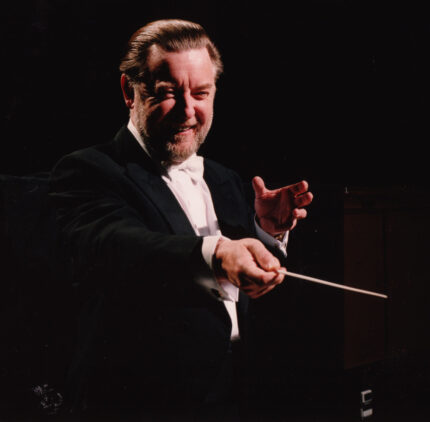“Adam” song cycle given first-rate sendoff by young baritone and CSO

Sir Andrew Davis, is of course, most familiar to audiences on the west side of the Loop, as music director of the Lyric Opera of Chicago. Yet he made his local debut conducting, not opera, but the Chicago Symphony Orchestra in a basically British program in 1975.
Davis returned to the CSO podium for the first time in four years Thursday night, leading the CSO in a program spotlighted by a significant premiere, Songs for Adam by James Primosch.
The Chicago Symphony performed Primosch’s From a Book of Hours in 2002, and that setting of Rainer Maria Rilke poems motivated the orchestra’s administration to sign up the American composer for another commission. This time Primosch chose a living poet, Susan Stewart, who penned six settings for the cycle. Her words are simple, but varied in expression, at times impressionistic, evolving from child-like simplicity to romantic yearning, wry irony, and despair.
Songs for Adam is scored for solo baritone and large orchestra with Brobdingnagian percussion (including vibraphone, crotales, bell-tree, temple blocks, two tam-tams, etc.). Yet Primosch releases the full fury of his vast forces only in a few places, and much of the scoring is strikingly luminous and transparent.
The first song depicts Adam’s stammer as he learns to “open his mouth to sing.” Ensuing sections reflect his naming of objects in the world, and his discovery and longing for Eve. The fourth setting is more dramatic, painting the expulsion from the garden. A melancholy exile follows, and the cycle concludes with a lamentation on Abel’s murder also noting the violence that continues down through the centuries.
Primosch has a real gift for vocal writing, and his predominantly tonal style skillfully reflects the texts, with a striking variety of expression in this 30-minute work. In addition to Davis’s superb direction and the first-rate playing of the CSO, much of the success for this premiere is due to the sterling advocacy of Brian Mulligan. The young baritone possesses a burnished, evenly produced instrument and his sensitive singing and exemplary diction made the greatest possible case for Primosch’s cycle. Mulligan brought impassioned fervor to the names, a sense of romantic yearning to the fourth setting and just the right sense of desolate expression with a ray of hope to the coda.
This was not quite the world premiere of Songs for Adam, since four of the six songs were “previewed” by the Civic Orchestra in March (isn’t that the same as “performed”?). The scale of the orchestration may mitigate against future performances in this cost-conscious era, but Primosch’s Songs for Adam is a rich-textured, moving and effective song-cycle that deserves to be heard. The audience clearly enjoyed the new work as well, enthusiastically applauding the composer and poet along with the musicians.
The Primrosch premiere was preceded by Stravinsky’s Concerto in E flat, better known as Dumbarton Oaks. Written in 1938 for the 30th wedding anniversary of the composer’s wealthy patron friends, the work takes its name from the couple’s palatial estate outside Washington D.C.
The clever 16-player retooling of the baroque chamber concerto may have been inspired by Bach but it is all Stravinsky in its 20th-century harmonic twists, mordant humor and rhythmic curveballs. Davis led a worthy performance, more affectionate than incisive, that would have benefited from more biting accents and rhythmic impetus.
The red meat on Thursday’s program was Mendelssohn’s Scottish symphony (No. 3), amazingly not heard at downtown CSO subscription concerts for 11 years. (Though it’s not billed as such, this week’s program kicks off a mini-Mendelssohn fest of sorts with Bernard Haitink leading the complete incidental music to A Midsummer Night’s Dream next week.)
Conductors from Great Britain seem to have a natural knack for this evocative score, and Davis directed the CSO in a brisk, vigorous account that deftly balanced the lyricism and dynamism. Even with a full string complement, Davis kept textures light and nimble, yet allowed all the numerous felicities to register, with atmospheric accounts of the introduction and Adagio. Apart from a wayward flute solo and some rambunctious tuttis in the Vivace, the CSO responded with customary verve and polish, the climactic horn theme exciting yet not blowsy, and John Bruce Yeh providing delightfully characterful clarinet solos throughout.
The program will be repeated 1:30 p.m. Friday and 8 p.m. Saturday. www.cso.org; 312-294-3000.
Posted in Uncategorized

